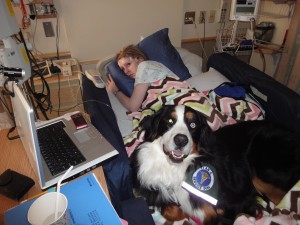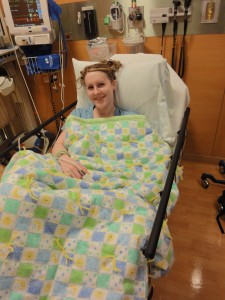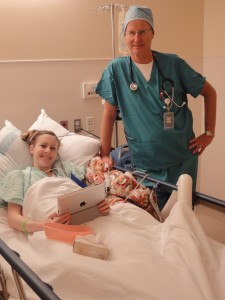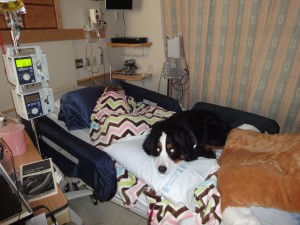Taken from: http://linzworld.wordpress.com/2008/03/27/50-ways-to-help-a-chronically-ill-friend/
This list of 50 Ways to Help a Chronically Ill Friend comes from my old blog and was inspired by the article ’50 Ways to Encourage a Chronically Ill Friend’ on the US National Invisible Chronic Illness Awareness Week website.
Read the Spoon Theory and send them a link if you think they might not have read it. It can be an amazing encouragement to chronically ill people to know that someone else understand their life.
Don’t forget they are sick! Get well cards and gifts dry up pretty quickly when you have a chronic illness, but you don’t get better and unless a hospital stay is needed, it’s easy for everyone to forget that their friend is still ill. If you know that someone with a chronic illness is flaring or is depressed or just because, send them a card or a gift – it’s doesn’t have to be much! Just the thought will make their day.
It’s likely that they will be unwilling to ask for help, but will still need it. If you want to help out, try not to ask “What can I do?” which either invites the answer “oh nothing” or means thought is needed. Instead, think of something you would be prepared to do and ask “Is it okay if I do …. for you?”.
Be easy going guests if you go visit. Don’t expect entertainment, but also be prepared to do things if wanted. Knowing that a guest isn’t bothered whether we go out for the day (it can be nice to take advantage of having someone there to go places you wouldn’t go alone) or whether they read a book or do the housework is fantastic. It takes the stress away.
Preparing food for visitors can be stressful as many chronically ill people will not always eat properly on their own and you can’t suggest crackers for lunch to a guest! Take easily prepared food like fresh bread, dips and cheese/cold meats with you, or pop out to the shops for something. Asking if anything is needed for dinner or offering to pay for a takeaway are also wonderful.
If the chronically ill person has a baby, children or even a dog, ask if they would like a break sometimes. You may not even have to take the children/dog out – just having someone prepared to come round and look after them can mean a decent nap or a long bath can be taken.
If you live locally, easy meals in Tupperware containers dropped off at the house can be a lifesaver…especially if you don’t need the container straight away so it can be frozen. Just make sure you know what they can and cannot eat beforehand! Many chronic illnesses come with dietary restrictions, and these can change with time.
Be flexible and never make them feel guilty about things they cannot do. Chronic illnesses do not give schedules of flares or unexpected issues – we do not know in advance how we will be feeling.
Ask, “Do you have an errand I can run for you before coming over?” “No matter how little you have, you can always give some of it away.” ~Catherine Marshall. Just listen . . . until it hurts to not say anything. And then listen some more. Chronically ill people usually have a lot to get off their chests and often feel they can’t burden the people around them. Let them know they can talk to you and you’ll listen.
If the situation arises, ask “Would you be willing to talk to a friend of mine who has recently been diagnosed with a chronic illness and offer her some encouragement?” It makes one feel good to know that our experience can offer someone else hope and that we still have a purpose in life.
Treat them to a gift of movie rentals via postal mail through a service like Amazon rentals. It doesn’t have to cost much and even a few months rental can be a great gift.
Buy them things to cheer them up after you’ve gone. An inexpensive colourful top, a bright umbrella, a teddy bear or cartoon….
Ask them if they’d like to join you for a spontaneous event, whether it’s a local concert, a picnic or just a trip to town. Although it may seem like they cannot go anywhere without lots of planning, if you get them on a good day, then they’ll know then and there they can go!
Understand that they live in a constant state of making decisions for which there is no guarantee they are making the right choice.
Encourage them to make a (preferably online) wishlist and to add anything they find that could make their lives easier. Financial difficulties often go hand-in-hand with a chronic illness and just because we know of something that could help us, doesn’t mean we can afford it! Then encourage other friends and family to check the wish list for present ideas.
Educate yourself. Look up their illness online and if they are having new treatments, try to learn a little about them. It helps to not have to explain every little thing and may well make you understand alot better. Reputable sites like WebMD and Medicinenet are good places to start, but remember that 1, not everything you read will be true, unbiased and completely up-to-date and 2, by the time you have a firm diagnosis, many patients are experts in their own condition(s). Don’t use your knowledge to try and correct the patient – they may simply be more up-to-date with research than whatever you read. Educate yourself and only educate the patient if they ask.
Research support in their area and then send them no-pressure I-just-heard-about-this-and-thought-you-might-be-interested emails or notes about it. More support is always good, but a lot of the time, chronically ill people may not have the spoons needed to research it. National Associations or Patient Information Points at local hospitals may know of local support groups.
Don’t forget the carers. Many chronically ill people are looked after by spouses or parents, even children. Helping the carer means that they can look after the sick person better and the sick person will not feel so guilty that their loved one is their carer. Giving the carer respite breaks, calling them up and asking “how are you doing?” and letting them talk to you frankly or even finding them support (see if they have a local branch of the Princess Royal Trust for Carers , for example) as you might do for the chromically ill person will all help.
Be their advocate. If you are at an event and walking/seating is an issue because of their disability, ask if they’d like you to take care of it. If they say you can, be firm but not rude. Don’t embarrass them by making accusations of discrimination or by making a scene.
Don’t tell them about your brother’s niece’s cousin’s best friend who tried a cure for the same illness and. . . (you know the rest).
Don’t pester them to try something you read or heard about and think might help. If you really think it might help, send them a newspaper cutting and leave it to them to decide whether to follow it up or not. Simple acts of kindness like holding the door open (they can be very heavy!) are lovely.
Never call them names related to their disability, like “hop-a-long” – at least not until they do it first and then be careful.
Never say “maybe you’re not that sick after all”, “it can’t hurt that much”, “you just have a low pain threshold” or minimise or trivialise the symptoms in any way. We get this enough from incompetent doctors when seeking a diagnosis. And far from making much of little aches and pains, most Spoonies are inclined to minimise their symptoms to the outside world – if we are showing pain, then it’s almost certainly a LOT of pain, not us making a fuss over nothing.
Temporary illnesses and injuries can help you to understand what a chronically ill person goes through, but it is never the same. We have symptoms that never ever go away and no one without a chronic illness can ever truly understand that. Be careful with simple throw-away phrases like “I know just what you mean” – you probably don’t! If you truly think you get tired or hurt like we do, then there must be something wrong with you!
If your friend has a disabled parking placard and you are driving, allow them to tell you where they want to park. If they’re feeling particularly good that day, they may not want to park in the “blue space.” Don’t be disappointed that you’ll have to walk farther – it’s a sign of independence and a striving for normality and should be encouraged as long as it’s not done to the point of overdoing things.
If you’re going out with a chronically ill friend and they mention they would like to or would normally use a mobility scooter, wheelchair, escalator, lift/elevator, etc don’t complain that it’ll take longer or draw stares. It may be the only way they can go out with you and not make themselves badly ill.
Accept that their chronic illness may be lifelong and may not go away. If they’re learning to accept it, don’t tell them the illness is winning and they’re giving in to it. They are simply being realistic!
See if there is any way you can enable them to do a loved hobby that their illness restricts. They may be an enthusiastic gardener who can’t dig or move a wheelbarrow or they may be a seamstress who can’t cut a straight line anymore. If by simple acts you can enable them to continue doing something they love, do it! It’ll be better than any gift.
Never assume they cannot do something without asking. It may be that it is something they can do on a good day and would like to, or that for them it is worth having to spend days resting before and afterwards.
Don’t not invite them to things because you don’t think they’ll be able to come. Having a chronic illness is isolating enough without feeling like you’ve been forgotten about completely.
Buy them a gift of a favourite magazine subscription. Having a chronic illness can be truly tedious at times, especially as you may not be able to get out to get things like magazines or may not be able to afford them.
If they don’t have a cordless phone, it would make a great gift! Comfortable phone headsets or phones with speaker capability make keeping in touch with friends even easier.
Ask what time of day is good for calls or visits. They may have a nap schedule they need to keep to or they may know that at certain times of day they’ll feel worse and won’t be up to polite conversation.
Be aware that what may seem like minor things to you can be big issues for a chronically ill friend. If you drive somewhere, ask if they’d like to be dropped off while you park. If you go for a picnic or to the beach, be aware that they may not be able to sit on the ground so bring a few folding chairs or cushions so they aren’t the only one perching above their friends. Walking from one shop to another may mean they need a rest before carrying on shopping. Trying to think about these things beforehand and to be accomodating will help alot…they are likely to not want to make a fuss and you helping in small ways can make a huge difference.
Give them a gift of an attractive plant like a rose bush that could be viewed from a window and say part of the gift is a planting service!
Never tease someone about how long they spend in the bathroom…don’t even mention it. If they’re taking a long time or going frequently, it’s because they need to!
If they have to stop work or receive disability benefits never say “well, aren’t you lucky. I’d love to sit on the sofa all day and get money for it”. Most chronically ill people would dearly love to be able to work and be independent…and sitting on the sofa soon gets very frustrating if that’s really all you can do.
If your friend misses a special event in your life, don’t be grumpy about it. Call and ask if you can bring some photos over and tell them all about it. Let them know that they are still a special person to them and you want them to be part of your life even if they couldn’t be there on the day.
If you’re coming for a visit or even just to go out somewhere, call and check it’s still okay before you leave.
Always ask before touching or hugging and never give them a power handshake or a friendly biff on the shoulder. Many people with chronic illnesses are in a lot of pain, particularly if they have symptoms like that of Fibromyalgia, where every touch signal can be magnified into significant pain. This changes all the time, so don’t stop hugging them, just check first and be gentle.
Recognise that pain and extreme tiredness can make anyone irritable (have you never snapped at someone when you’re sick with flu?) and that various medications can affect behaviour. If your friend does or says something rude or hurtful, give them the benefit of the doubt. They may well be horrified afterwards.
Make sure they have an answering machine to screen calls when they feel ill…and don’t get offended or call back repeatedly if you get put through to the answering machine!
Check that your perfume/aftershave is okay with them. Many people with chronic illnesses end up with chemical sensitivities where some smells can make them physically ill. They may not want to offend you even if you are unconciously making them feel worse!
Never smoke around chronically ill people who don’t smoke. As well as chemical sensitivities, they may have breathing issues or the smoke might cause problems with a weak or suppressed immune system.
Never criticise someone for taking medications that may be addictive, even if they are ones with bad associations like methadone. Pain relief or illness treatment options can be very limited and it is far better for someone to have medication that makes their life bearable even if it is addictive, than to be in awful pain forever. Recognise that mental and physical addiction such as heroin addicts get is very different to someone needing a drug because without it they can’t get up.
Encourage them to research their illness and never tell them it’s making them worse. Self-advocacy in chronically ill patients has been proven to be beneficial to the patients and can be their best hope of getting a diagnosis, appropriate treatment and coming to terms with their illness.
If they need to cry, let them and just be there for them. Never say “don’t cry” or “this isn’t worth crying about”…it obviously is to them! And remember that while help is always welcome, do not make a chronically ill person into your personal project – at least not so they notice! Constant suggestions can be stressful in themselves! be subtle and be prepared to take a step back if needed.
















